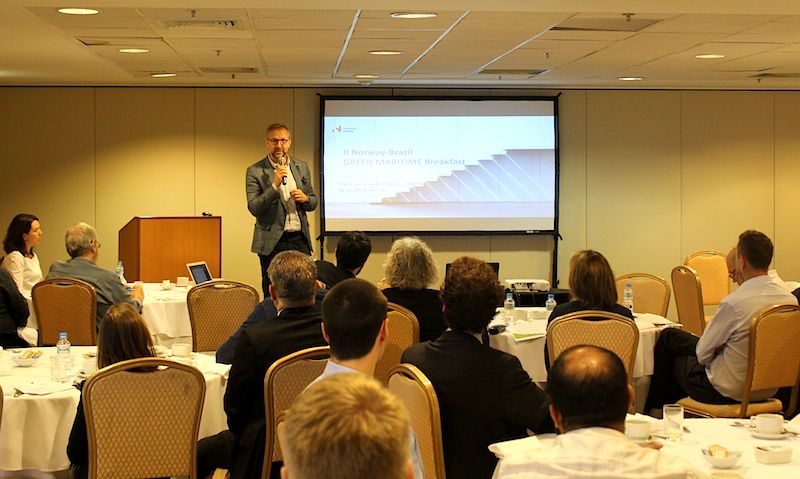 The II Norway – Brazil Breakfast Seminar on green shipping took place on October 26, 2018.
The II Norway – Brazil Breakfast Seminar on green shipping took place on October 26, 2018.
The seminar was hosted by the Norwegian Embassy and Innovation Norway with the support of Norwegian Oil Spill Control Association (NOSCA), Norwegian Shipowners Association in Brazil (ABRAN) and the Brazilian Society of Naval Engineering (SOBENA).
The organizers wanted to show how Norway is committed to taking a greener direction in shipping. The ocean industries represent 70 percent of Norwegian exports, and OECD believes that the value creation from the ocean economy will double by 2030.
Inspiration
Norway´s prime minister Erna Solberg has said that the ambition is to be the world´s best ocean space nation, a country others look towards and wants to cooperate with. The maritime sector is also very important to Brazil, and there is a great potential for collaboration between the two countries. Mr. Jan Dybfest from the Embassy of Norway in Brasilia was the first speaker at the seminar and he set the stage by presenting Norwegian policies and experiences on green maritime.
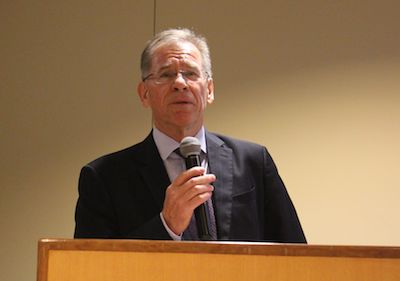
Mr. Jan Dybfest.
«Green shipping is a main priority to the Norwegian government, and low and zero emissions solutions are important to guarantee competitiveness in the future. There is also a huge potential in reducing emissions from shipping globally, and we need a global approach and international requirements through the International Maritime Organization (IMO). The next step is legally binding measures and Norway will do its utmost for this to happen. We are in the forefront of decarbonizing maritime transport through new technology, and this has been possible because of an innovative and strong maritime industry, along with government policies. We hope that our experiences can inspire others to take similar initiatives. Green shipping is good for business and good for the environment», Mr. Dybfest said in his opening remarks.
Stein-Gunnar Bondevik, Director of Innovation Norway in Brazil, presented several cases and technologies from Norway in his presentation. He listed developments in fishing and aquaculture, offshore wind and talked about autonomous concepts in shipping. Equinor and Petrobras recently sign an MOU on offshore wind development in Brazil.
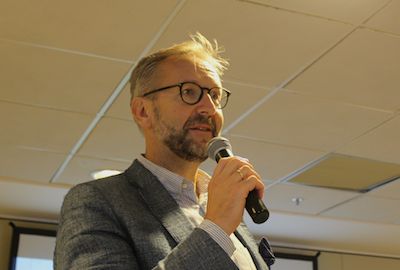
Mr. Stein-Gunnar Bondevik
«The downturn in oil and gas taught Norway a lesson. We saw that we were too dependent on one sector and started to look for other ways, and realized we have this fantastic competence and engineering capabilities which can be employed in so many other directions. It gave us new and interesting technologies in a short period of time», Mr. Stein-Gunnar Bondevik, Director of Innovation Norway says.
Norway has 130 ferry routes and by 2030, a zero emission requirement for ferries has been established.
«What is going on in batteries and new propulsion in Norway is fantastic, and Norway has become a global testbed. Politics actually work, and with the right incentives and requirements in place, it works. This is an important message», Mr. Bondevik said.
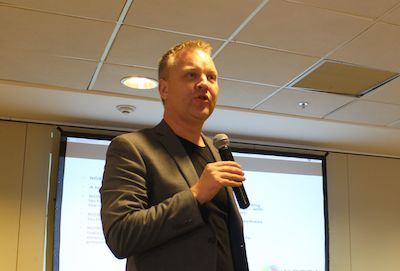
Mr. Vegard Hovstein
Oil spill
This October, the Norwegian Oil Spill Control Association (NOSCA) held its 23. international seminar in Rio de Janeiro, and Vegard Hovstein presented NOSCA to the seminar.
NOSCA is a non-profit organization established in 1993, that aims to be expert committee for oil protection in Norway. It has 24 members, both governmental agencies and private stakeholders.
«Our concept is exchange of experience, and we hold workshops, do consultancy, seminars and exercises. This was the third time that our annual, international seminar takes place here. Rio is like our second home and a natural candidate to host the event due to the increasing oil and gas activities and the strong international presence here», Mr. Hovstein said.
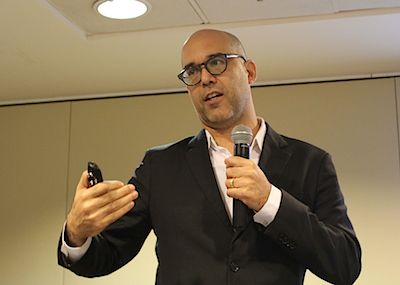
Mr. Luis de Mattos
The overall goal for the NOSCA seminar is to actively contribute to international cooperation within the field of oil spill contingency, and the strengthened presence of Equinor in Brazil forms a basis for exchanging Norwegian – Brazilian experiences within oil spill contingency presenting use cases from both countries.
Mr. Luis de Mattos, president of the Brazilian Society of Naval Engineering (SOBENA) provided the seminar with an overview and perspectives for Brazil.
He presented projects using solar energy, like the Barco Solar in Pará, transporting children to school, a solar boat race for universities, and an ocean waves energy plant in Ceara.
Testbed
The last speaker was Ricardo Cesar Fernandes, from the Brazilian Association of Norwegian Shipowners (ABRAN), and he talked about how shipowners are fostering green initiatives in the maritime industry.
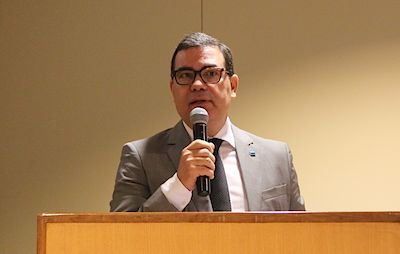
Mr. Ricardo Cesar Fernandes
«Norway is leading this race and has become a green testbed for green shipping. Climate change is real, and something had to be done. This is the backdrop for what has happened. IMO has committed to a 50 percent reduction in emissions and has also approved caps on emissions on sulphur oxides and nitrate oxides. Shipping is already the most efficient method of transporting goods, but new standards will be a game changer», he concluded
By Runa Hestmann, NBCC journalist
(runa.tierno@nbcc.com.br)
:

